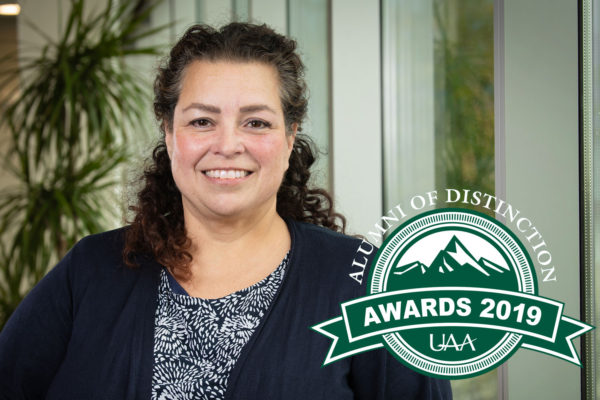Alumni of Distinction: Angelia Trujillo
by Matt Jardin |

2019 Alumni Humanitarian award recipient Angelia Trujillo, women's health nurse practitioner with Denali OB-GYN Clinic and associate professor with UAA School of Nursing. (Photo by James Evans / University of Alaska Anchorage)
Angelia Trujillo, B.S. Nursing Science '97, M.S. Nursing Science '04, will receive the 2019 Alumni Humanitarian award at the Homecoming Breakfast on Oct. 4.
In hindsight, turning points can be hard to identify. However, Angelia Trujillo can pinpoint exactly when she wanted to become a forensic nurse.
Originally from Oregon, Trujillo moved to Anchorage in order to attend UAA to study nursing. One day in 2002 while working to earn her master's, a guest speaker visited her public health nursing workplace to introduce the world of forensic nursing. Trujillo was hooked.
"I felt an affinity toward the work," says Trujillo. "I could see the impact that lots of people had based on these traumatic events in their lives. Just knowing that they had the opportunity to get knowledgeable care and could come out the other side better made complete sense to me."
Since then, Trujillo has become a leader in forensic nursing in Alaska, which she describes as a multidisciplinary field that's way more robust than how it's depicted on TV - more of a joint effort between health care and law enforcement that's just as much about advocating and supporting patients as it is about solving crimes.
Over the years, Trujillo has helped patients and victims by working in virtually all manner of nursing positions - forensic nurse examiner, sexual assault nurse examiner, traveling public health nurse, you name it. All the while working to become a Doctor of Nursing Practice from the University of Tennessee.
Understandably, working tirelessly for the betterment of victims of violence can be intense work. Needing a respite, Trujillo started transitioning to teaching about the forensic nursing field and sexual assault violence at conferences around the state. Eventually, a community health nurse professor position opened up at UAA, and Trujillo jumped at the new opportunity.
Back at her alma mater, Trujillo takes on a role similar to the one that inspired her in 2002 - introducing students to the world of forensic nursing and making sure it's a field they're prepared to enter.
"It was this amazing confluence and one of the best decisions I made," says Trujillo. "I was able to continue teaching forensics but also incorporate community health and community-level change, which is just as important as anything else."
That mission to enact community-level change is currently underway with the Alaska Comprehensive Forensic Training Academy, implemented by Trujillo as a joint effort between the state's Council on Domestic Violence and Sexual Assault and the UAA School of Nursing. According to Trujillo, the program is not only about educating current and future doctors and nurses, but also broadening the scope of victimization for the wider community by using hard data.
"The challenge is we're finding lots of crossover in victimization - elder abuse, child abuse, domestic violence and sexual assault. There's a huge overlap between all of those and it does our patients a disservice when we only recognize the response for sexual assault. That's really the focus of the project, to promote forensically-related health care for anyone of any age, gender and lifestyle," says Trujillo.
Having just finished its second offering, the academy is successfully receiving a lot of buy-in from the community, both financially and in human capital. The academy just received an additional $88,000 in funding, which Trujillo notes goes a long way, literally and figuratively, toward covering training costs for rural providers.
In terms of human capital, the academy's educational component provides nurses, doctors, nurse practitioners and physician's assistants the necessary training to recognize the signs of victimization and help patients instead of referring them to specialty programs.
"We hear stories in the news all the time about how much victimization is happening in our communities. So we need a community focus rather than an individual focus," says Trujillo. "The biggest piece for me is looking at how we have our communities come together and start trying to solve these issues. You can't do that unless you have the data. If all we're doing is looking at sexual assault, we're not seeing the whole picture. But when we start caring for victims of other kinds of violence, I think we'll get an even truer picture of what's out there so we can have a better idea on how to start making change."
Written by Matt Jardin, UAA Office of University Advancement









